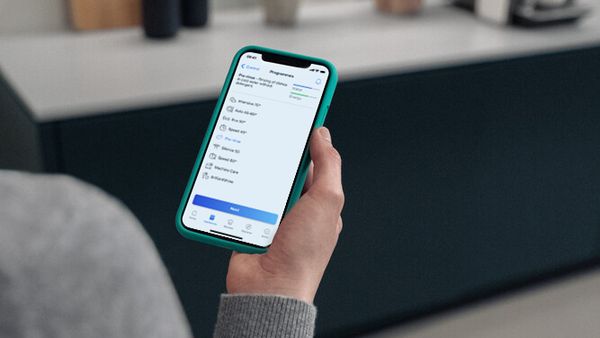Is espresso stronger than brewed coffee? Which way do you hang your toilet paper? Some myths and questions have the potential to stick around forever, offering a source of debate across generations. Pre-rinsing dishes before putting them in the dishwasher is one of those myths. Home Connect is here to put an end to the never-ending debate – for more sustainability in your smart home. Spoiler alert: pre-rinsing is unnecessary.
Save water, time, and money
Pre-rinsing your dishes after every meal will not only cost you time and a potential debate with someone who knows better, you may also pour a considerable amount of water (and money) down the drain in the process. Around 20 liters* of water can be wasted this way per minute, not to mention the heating energy if you use hot water.
Why pre-rinsing is a thing of the past
Modern appliances like the one you bought from Bosch, Siemens, Gaggenau, or Neff are equipped with a sensor that checks how dirty your dishes are. Based on the degree of soiling, the setting will be adjusted, leaving you with nothing but shiny clean dishes, glasses, and cutlery. Pre-rinsing, however, may trick the appliance into choosing a lighter wash which can lead to the opposite of the desired effect and less clean dishes.
Basically, all you need to do is scrape food solids off your dishes. If you haven’t already, we also recommend giving Program Assistant a go – a practical feature in your Home Connect app that selects the ideal dishwasher setting using your indications on soiling, type of dishes, and cleaning priorities such as efficiency, hygiene, or loudness.
Go to your dishwasher
Besides using eco mode and skipping the pre-rinse, these easy-to-follow sustainability boosters hold additional savings potential:
#1 Keep your dishwasher clean. Leftovers in the filter can prevent optimal water drainage requiring more water and energy.
#2 Avoid the buildup of limescale. Refill dishwasher salt regularly to prevent limescale deposits in the dishwasher.
#3 Fill your dishwasher correctly. A half load uses more water whereas an appliance which is too full may require an additional wash. Make sure your dishwasher is full, but not too full.
#4 Close the door. Keeping your dishwasher door closed will prevent residuals from drying, which makes them harder to remove.
#5 Account for water hardness. Set your local water hardness before you start using your dishwasher; this will reduce energy consumption while increasing the lifespan of your appliance.
* Precisely 22.71 liters (=6 gallons): See https://www.consumerreports.org/dishwashers/dont-bother-pre-rinsing-your-dishes





